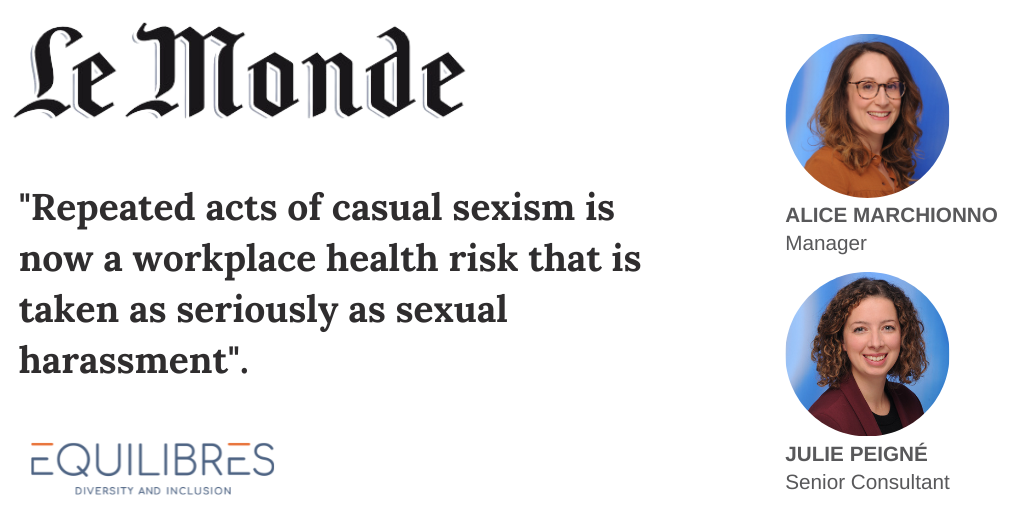“Repeated acts of casual sexism is now a workplace health risk that is taken as seriously as sexual harassment”.

In this article that was initially published in French national daily Le Monde, Alice Marchionno and Julie Peigné, both consultants in gender equality and diversity and inclusion, explain that a zero-tolerance approach to sexism in the workplace, which could result in sanctions up to and including dismissal, will be in force from March 2022.
Opinion. Surveys conducted since 2014 by the French Commission for Human Rights, the High Council for Workplace Equality between Women and Men and, more recently, the Jean Jaurès Foundation (a leading think-tank), bring our attention to the fact that sexism in the workplace remains rife and has harmful consequences, for those who fall victim to it, of course, but also for the rest of the organisation.
The notion of sexist behaviour was added to the Labour Code in 2015, but it took several years for sexist behaviour and comments to finally be considered genuine occupational hazards, in the same way as sexual harassment has been for a much longer time. Indeed, although the working world is replete with examples of firms that trumpet a supposed zero-tolerance towards sexism, few have implemented policies to prevent casual sexist behaviour and comments, along with a procedure for dealing with it.
Thankfully, awareness of the impact of casual sexism has reached new levels thanks to the Health Act of August the 2nd, 2021, which broadens of the definition of sexual harassment at work. Currently, sexual harassment is defined as "repeated comments or behaviour with sexual connotations which either undermine a person’s dignity because of their degrading or humiliating nature, or create an intimidating, hostile or offensive situation for them". From March 2022 onward, "repeated comments or behaviour with sexist connotations" will also qualify as sexual harassment.
Thus, while the notions of gender-based violence and sexual violence remain conceptually distinct - the first being demeaning or humiliating conduct based on gender stereotypes, the second being comments or behaviour that sexualise or sexually objectify a person - this new, broader definition of sexual harassment points to the danger that sexist behaviour represents when it becomes systemic.
Clear communication
Why consider repeated 'sexist' behaviour as being as serious as repeated 'sexual' behaviour? The underlying rationale is to tackle everyday and commonplace disrespectful behaviour, such as sexist comments or jokes, and thus create a culture of respect and inclusion. By doing so, it also aims to stop the potential drift towards more serious and harmful behaviour that could affect both women and men at work, be they victims or witnesses.
The underlying rationale is to tackle everyday and commonplace disrespectful behaviour, such as sexist comments or jokes, and thus create a culture of respect and inclusion
What consequences does this have for employers and companies? In recent years, a growing number of firms and public entities have been tackling sexist behaviour and sexual harassment, reflecting on their prevention policy and better defining their internal procedures to deal with it when it arises. These good practices will not only have to become generalised, but also reinforced and explained better.
From the 31st of March 2022, in order to comply with the health and safety obligations employers owe their employees, firms will have to give greater importance and visibility to combating sexist behaviour, both in one-on-one relations and in group dynamics. As repeated or systemic sexism is now a work-related health risk that is taken as seriously as sexual harassment, employers will have to adapt their prevention policy and procedures to deal with it accordingly.
How can we take tangible action? First, for change to be effective, managers and executives must act consistently with their stance against casual sexism in the workplace. This can take the form of clear communication against sexist and sexual violence in the workplace, as well as setting the highest standards, in discourse and posture, for themselves.
Goodwill and mutual respect
Second, all the stakeholders involved in preventing of sexism, such as the human resources department, the members of the Works Council (CSE in French) and management, must relay information and raise awareness among employees. Indeed, informing and providing explanations is essential to support the change in attitudes and practices that will create a climate of trust and ensure that people's views are freely heard.
Last, the procedure for handling reports of inappropriate behaviour, which must be clear, well-defined and shared, will henceforth have to be updated to include all kinds of repetitive behaviour, whether merely sexist or sexual. Consequently, repeated sexist behaviour will be grounds for an investigation and serious disciplinary sanctions in the same way as sexual harassment.
This represents a significant change for both management and potential perpetrators: until now, sexist comments or behaviour were often dealt with mere verbal reprimands by managers and, if the comments were particularly offensive or humiliating, sanctioned with written warnings. From March 2022 onward, however, repeated sexist behaviour could result in more severe sanctions, including dismissal.
Obviously, it will be necessary to ensure consistency in dealing with cases so that the solutions and sanctions applied are always justified and proportionate, the aim of any prevention and treatment policy being to promote a culture of respect and inclusion at work.
Ultimately, the coming into effect of the law can encourage us to transform a constraint into an opportunity, to rebuild interpersonal and professional relations based on benevolence and mutual respect, so that collective work is a source of performance and personal fulfilment for each and every worker.

Alice Marchionno
Manager

Julie Peigné
Senior Consultant

